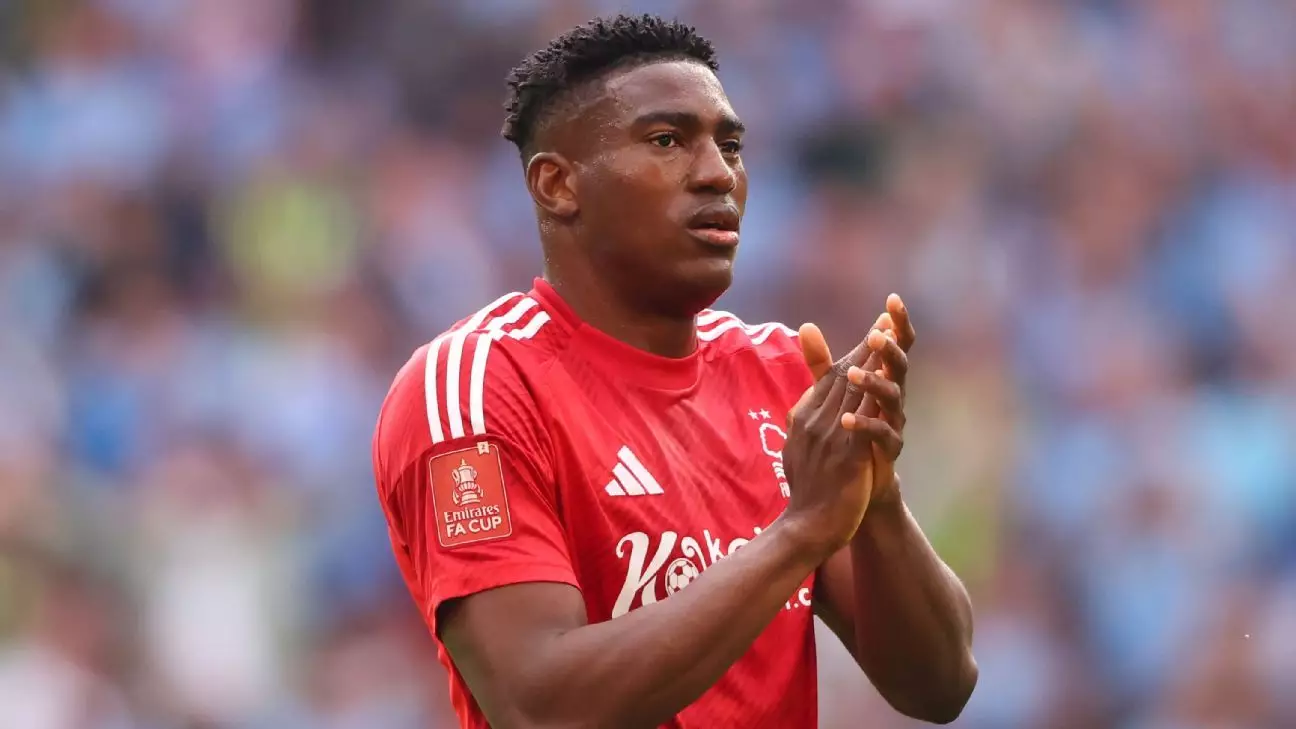In the world of professional football, injuries are an unfortunate reality that can alter not just the immediate game but also the course of a player’s career. The recent abdominal injury suffered by Nottingham Forest striker Taiwo Awoniyi during a crucial match against Leicester City stands as a stark reminder of the physical toll this sport can impose. The incident, which occurred when Awoniyi collided with the goal frame after coming on as a substitute, evidently impacted not only the team’s performance but also raised urgent concerns about player safety and welfare. This was not just another injury on the field; it became a moment fraught with emotional weight, reflecting the fragility of athlete well-being amidst competitive fervor.
The Circumstances Surrounding the Injury
Awoniyi’s situation became a subject of intense scrutiny, particularly as tensions flared on the sideline. Nottingham Forest’s owner, Evangelos Marinakis, expressed visible frustration during the game, a reaction rooted in the miscommunication regarding Awoniyi’s condition. This incident raises critical questions: Should managers be more cautious, or should players have a more informed say in their ability to continue? With Awoniyi signaling for continued play, the coaching staff, particularly manager Nuno Espirito Santo, faced a pivotal decision that ultimately resulted in Forest playing with effectively ten men. This decision reflected both a lack of clarity in medical assessments and the competitive instincts that often overshadow safety in high-stakes matches.
Induced Coma: The Medical Response
Awoniyi’s condition necessitated immediate medical intervention. Reports revealed that he was placed in an induced coma following urgent surgery to facilitate his recovery and manage his heart rate post-operation. Inducing a coma in such scenarios, while alarming, is indicative of a strategic medical decision aimed at minimizing movement and promoting recuperation. The gravity of his situation illustrates the often unseen risks athletes face. While the club officially stated that Awoniyi was “recovering well,” this medical response demonstrates the serious nature of sports injuries that, while frequently downplayed, can indeed be life-threatening.
The Emotional Investment of Leadership
One of the standout aspects of this ordeal was Marinakis’s passionate involvement. His confrontation with the management team on the sidelines after witnessing Awoniyi’s discomfort illuminates the intense emotional investment that club leadership holds towards their players. The club’s subsequent statement capturing Marinakis’s frustrations underscores the human element inherent in sports, where the dichotomy between competitive success and player safety often clashes. His actions reflected a leader driven not just by the goal of winning but by genuine concern for the athletes who are the fabric of the team. This portrayal of leadership is pivotal; it moves beyond mere authority to embrace empathy and accountability.
Looking Ahead: Nottingham Forest’s Path to Champions League Qualification
As Nottingham Forest simultaneously grapples with one of their player’s health and their ambition for a Champions League spot, the balance of aspiration and empathy becomes increasingly pronounced. Currently placed seventh in the league and just one point behind Chelsea, every match becomes crucial for their qualification hopes. However, the pressure of potential success can raise concerns about the team’s approach to player welfare. The urgency to win is undeniably potent, yet it must not forget the fundamental principle that a football club is only as strong as its players’ physical and mental health.
A Broader Perspective on Athlete Health and Safety
Ultimately, Awoniyi’s incident raises important discussions about the protocols and practices surrounding player safety in professional sports. This incident should serve as a wake-up call for clubs to reinforce medical oversight, adhere strictly to safety protocols, and ensure that players are genuinely fit to play. The culture of prioritizing win-at-all-costs must evolve, embracing a model that fosters comprehensive athlete wellness. The future of sports hinges not just on the thrill of competition but also on the human lives that live and breathe the game. Recognizing and addressing the complexities of player injuries can pave the way for a safer, more responsible sporting environment.

